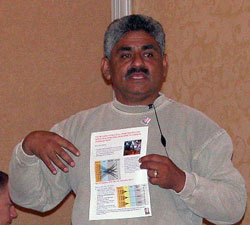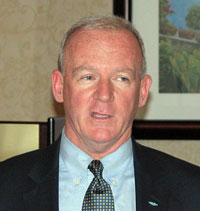 As we drove over the Bay Bridge today I tried to get a good shot of Alcatraz.
As we drove over the Bay Bridge today I tried to get a good shot of Alcatraz.
The rock actually looks very pretty sitting out in the bay. We were a long way off and moving pretty fast.
So that’s about all the sight seeing photos for you from San Francisco until tomorrow. We’ve got a final dinner tonight and will get to meet the AASHTO executive director, John Horsley. I’ll interview him about our trip and probably won’t have a chance to post again until tomorrow evening in Reno, NV. You can follow the convoy route by visiting the AASHTO website here.


 We’re not going to drive across the Golden Gate Bridge but I did get to see it on a beautiful sunny day here in San Francisco.
We’re not going to drive across the Golden Gate Bridge but I did get to see it on a beautiful sunny day here in San Francisco. Here’s some of the drivers of the convoy vehicles at the Lincoln Park staging area for tomorrow morning’s kickoff event. We got a lesson and view of our course for tomorrow through San Francisco.
Here’s some of the drivers of the convoy vehicles at the Lincoln Park staging area for tomorrow morning’s kickoff event. We got a lesson and view of our course for tomorrow through San Francisco. Here’s what I think we’ll be seeing most of tomorrow, at least the lead vehicle in our Interstate Celebration convoy will.
Here’s what I think we’ll be seeing most of tomorrow, at least the lead vehicle in our Interstate Celebration convoy will. The California Highway Patrol was a big part of our day. The main man was Lt. Avery Brown who’s helping coordinate everything and they have a lot of assets involved in tomorrow’s kickoff. He says that about 75 CHP personnel will be involved and that doesn’t count San Francisco police.
The California Highway Patrol was a big part of our day. The main man was Lt. Avery Brown who’s helping coordinate everything and they have a lot of assets involved in tomorrow’s kickoff. He says that about 75 CHP personnel will be involved and that doesn’t count San Francisco police.

 Kansas Governor Kathleen Sebelius will be the keynote speaker at the 19th annual
Kansas Governor Kathleen Sebelius will be the keynote speaker at the 19th annual  Indy Car drivers seem pretty pumped about ethanol, according to this
Indy Car drivers seem pretty pumped about ethanol, according to this  We have a lot of participants in this AASHTO Interstate Convoy and I’ll be featuring them as I have time during the trip. One of them that we learned about this morning is Albert Renteria, founder and president of
We have a lot of participants in this AASHTO Interstate Convoy and I’ll be featuring them as I have time during the trip. One of them that we learned about this morning is Albert Renteria, founder and president of  In 1919 Lt. Col Eisenhower (later to become President of the USA) made a cross country trip with primarily military participants. It showed the need for a good system of roads in this country which became the interstate system. Our commemorative journey in the reverse direction wouldn’t be complete without today’s military, represented by these Army soldiers. They are from left to right, Sgt. Alicia Sexton, SSG Eric Miller, SSG Adron Hayes and Sgt. Eggleston Jeter. All are with the Movement Control Team. They’ll be leading our convoy.
In 1919 Lt. Col Eisenhower (later to become President of the USA) made a cross country trip with primarily military participants. It showed the need for a good system of roads in this country which became the interstate system. Our commemorative journey in the reverse direction wouldn’t be complete without today’s military, represented by these Army soldiers. They are from left to right, Sgt. Alicia Sexton, SSG Eric Miller, SSG Adron Hayes and Sgt. Eggleston Jeter. All are with the Movement Control Team. They’ll be leading our convoy. Part of our training session here in San Francisco prior to departing on our cross country trip to celebrate the interstate involved becoming certified in the
Part of our training session here in San Francisco prior to departing on our cross country trip to celebrate the interstate involved becoming certified in the